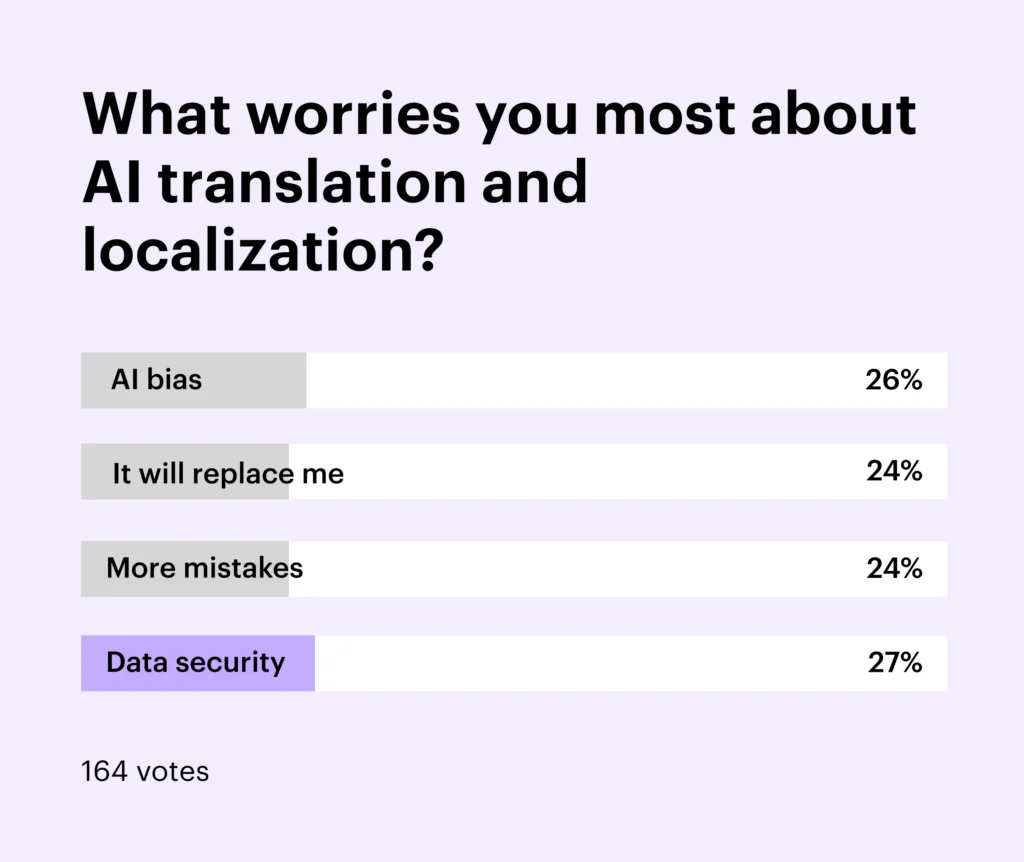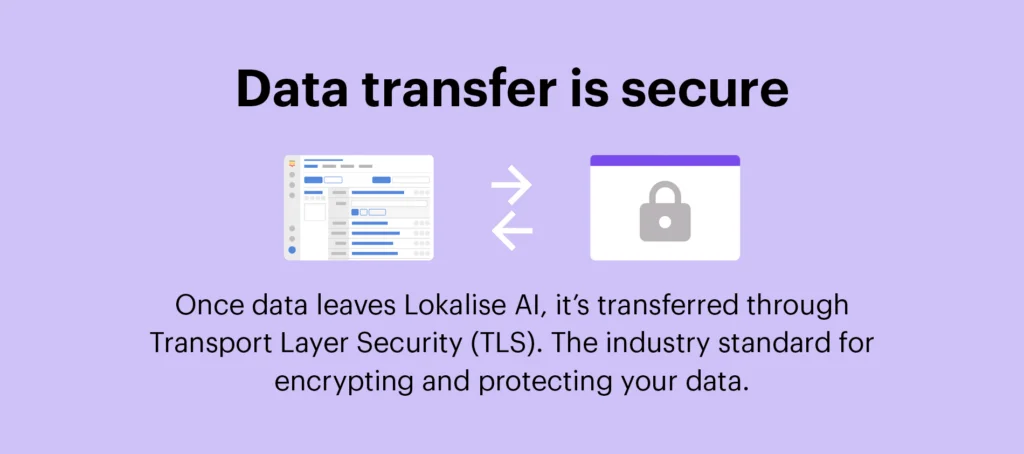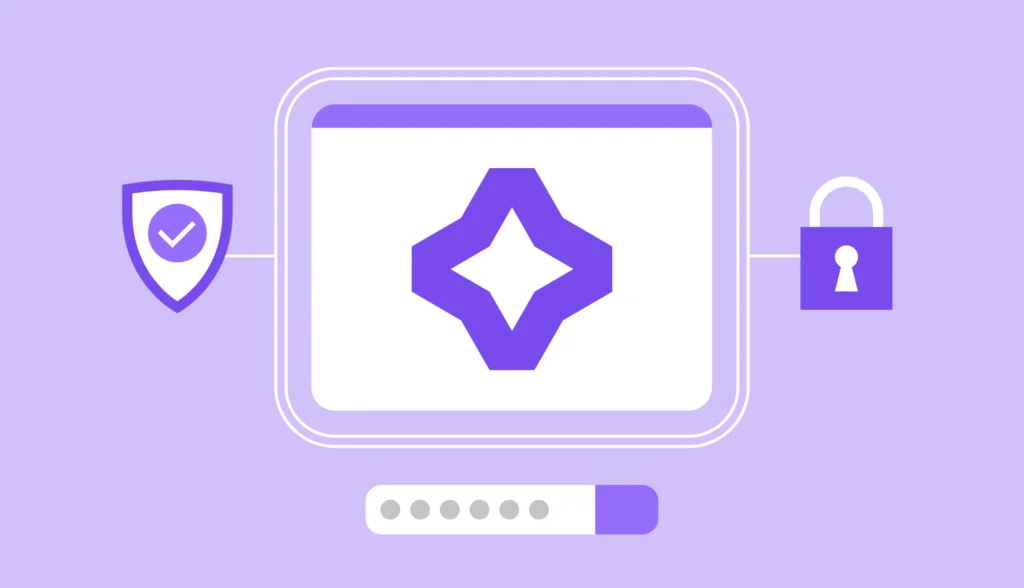AI-powered tools all share one characteristic:
They are powered by large language models (LLMs) like Open AI.
Naturally, this has led to many of our customers questioning the security of their data in Lokalise AI.
In a recent LinkedIn poll about AI for translation and localization, data security was the top concern among voters (only by a whisker, mind):

So we’re here to put your worries to rest.
In this guide, we’ll dive into AI security for Lokalise AI, including what is AI translation, encryption, compliance, access controls, data handling practices, and more.
We will also explore some best practices for safeguarding your data in the age of generative AI translation, especially when integrating software internationalization practices to ensure data security during localization processes.
How we keep your data safe with Lokalise AI
While AI offers efficiency and accuracy, there are concerns about what happens to your data during and after translation and localization. Is it stored, is it used for training, and are there added risks and vulnerabilities?
At Lokalise, not only do we follow best data security practices, we make sure our partners do too.
That’s why we use Open AI. Together, we take these top security measures to make sure your data is in safe hands:
- State-of-the-art encryption
- Compliance with industry standards
- Robust access controls
- Regular security audits
- Strong data handling practices
- Safeguarding against data leaks
- Preparation for redundancy and disaster recovery
- Continuous threat monitoring and detection
- Transparency and trust
How your data is kept safe with Lokalise AI
Put your worries to rest. Explore AI security for Lokalise AI.
DownloadState-of-the-art encryption
OpenAI can be used in two ways:
- Through the ChatGPT app
- Via a robust API platform, which lets businesses incorporate OpenAI models directly into their products, applications, and services.
Lokalise AI connects to Open AI through an API, to securely send data back and forth. Once data leaves Lokalise AI, it’s transferred through Transport Layer Security (TLS)* to secure both data in transit and at rest. This means your data is protected throughout its lifecycle.

*TLS is the industry standard for encrypting and protecting your data.
Compliance with industry standards
Compliance with industry standards is essential for maintaining a secure AI translation infrastructure. Open AI and Lokalise AI adhere to rigorous security certifications, including ISO 27001, SOC 2 Type II, and GDPR. These certifications demonstrate our commitment to data privacy, security, and regulatory compliance.
Robust access controls
Open AI and Lokalise AI enforce strict access controls and implement strong authentication mechanisms to prevent unauthorized access. These measures ensure that only authorized personnel, with appropriate permissions, can access and handle sensitive data.
Regular security audits
Open AI takes a proactive approach to security audits to ensure the integrity and resilience of their infrastructure. They carry out regular security audits to identify any weaknesses or gaps in security measures, allowing for prompt action.
Strong data handling practices
Open AI and Lokalise follow strict data handling procedures, including data minimization, purpose limitation, and secure deletion when data is no longer needed. OpenAI will not use your data for training purposes — neither will Lokalise — or metadata sent from Lokalise through their API, unless you explicitly opt in. To help identify abuse in model usage, Open AI may securely retain data for up to 30 days. After this period, it will be permanently deleted from OpenAI’s systems.
Safeguarding against data leaks
Protecting confidential corporate information is a top priority at Lokalise AI and Open AI. We take measures to prevent data leaks and unauthorized access to sensitive data, including monitoring user data for potential leaks, implementing strict access controls, and educating employees on data privacy and security protocols.
Prepare for Redundancy and Disaster Recovery
A redundant system and backup mechanisms are employed by Open AI and Lokalise AI to mitigate the impact of system failures or disasters. This helps prevent data loss and downtime, so you can continue to leverage AI translation without any interruptions.
Monitor and detect threats continuously
Open AI uses advanced security monitoring tools to detect and mitigate potential security threats in real-time. Continuous threat detection helps maintain a secure AI translation environment and provides early warning of potential breaches.
Foster transparency and trust
Transparency and trust are foundational principles in AI translation security. Open AI maintains a transparent approach to security by documenting its security policies and practices. This transparency allows customers to understand how their data is handled, stored, and secured, fostering trust and confidence in the platform. By partnering with providers that prioritize transparency and actively engage with customers, you can build a strong foundation of trust in your AI translation processes.
Educate and empower your team
Finally, you need to always educate your team about AI translation security and keep them up to date. By training employees on safe and proper use of AI translation tools, you can prevent or lessen the risk of human error. This training should include guidelines on data sharing, an overview of language learning models and their potential risks, and approval processes for using AI translation services. Best AI translation tools often come with built-in security features, but by fostering a culture of security awareness, you can empower your team to actively contribute to AI translation security.
In Lokalise AI, what customer data do we actually use?
Lokaise AI only uses the following data to translate your content:
- Source content and translated content (in some features)
- Metadata about languages
- Metadata about keys and translations (e.g. character limit, key description, translation context)
- Glossary terms
- Uploaded style guides
- Additional context provided for AI jobs
Conclusion: embrace AI for translation knowing your data is safe
AI translation services have the potential to speed up your translation process while cutting costs. But, you need to make sure you choose the right service that fits your data security obligations and understand how AI translation works to ensure it’s implemented effectively and responsibly.
Lokalise AI implements robust AI security measures in collaboration with Open AI, our trusted AI provider, so you can translate at speed, in bulk, with context—and with confidence.
Want to see what Lokalise AI can do? Book a demo or watch Lokalise AI in action.





